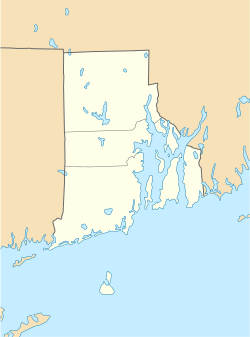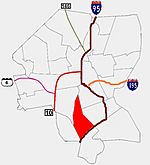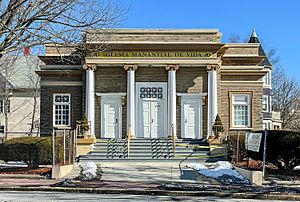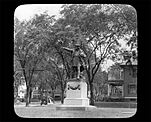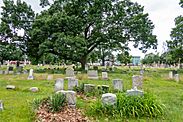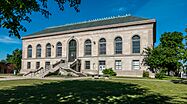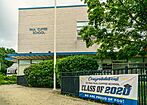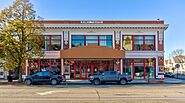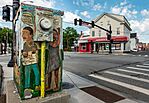Elmwood, Providence, Rhode Island facts for kids
Quick facts for kids |
|
|
Elmwood Historic District
|
|
| Location | Providence, Rhode Island |
|---|---|
| Built | 1875 |
| Architect | Multiple |
| Architectural style | Late 19th And 20th Century Revivals, Late Victorian |
| MPS | Elmwood MRA |
| NRHP reference No. | 80004603 |
| Added to NRHP | January 7, 1980 |
Elmwood is a neighborhood located in the South Side of Providence, Rhode Island. It's shaped like a triangle, with its borders defined by Broad Street, Elmwood Avenue, and Interstate 95.
Contents
Exploring Elmwood's Past
Before the 1850s, the land where Elmwood now stands was mostly used for farms. As the city of Providence grew, especially with more factories and shipping businesses, the area began to change. Between the 1840s and 1860s, Providence's population grew a lot. This led to more homes being built southwest along Broad Street. As more people moved in, the remaining farms were divided into smaller plots for building.
The neighborhood got its name from Joseph J. Cooke, one of its main developers. In 1843, he bought a large piece of farmland and called his estate "Elmwood." He and other developers wanted to create a beautiful suburban community. They planned wide streets and planted many elm trees to provide shade.
As public transportation got better, first with horse-drawn carriages (omnibuses), then horse-drawn streetcars, and finally electric streetcars, more people moved to Elmwood. Some factories also moved there. The area near Public Street, Elmwood Avenue, and Potters Avenue became a popular place for middle and upper-class families to live.
Later, when cars became popular, many car dealerships, repair shops, and gas stations opened along Elmwood Avenue. When the trolley service was stopped, Elmwood Avenue was made much wider. Sadly, this meant that many of the elm trees Joseph Cooke had planted had to be removed. These changes made the neighborhood look and feel different.
In the 1950s, Interstate 95 was built. Many single-family homes in Elmwood were turned into apartments. Along with older houses and busy traffic, the neighborhood became less attractive to middle-class families. Many people moved away during this time. By the early 1970s, some old houses were even torn down, and Elmwood started to look run-down.
In recent years, people have worked hard to fix up many old mansions and make the neighborhood better. In 1980, two large parts of Elmwood were added to the National Register of Historic Places. These areas are now known as the Elmwood Historic District. They are special because of their beautiful 19th-century revival and Victorian-style houses. The City of Providence has also created local historic districts called North Elmwood and South Elmwood. These districts help protect old buildings and the neighborhood's history by setting rules for how houses can be changed.
People and Cultures in Elmwood
Elmwood is known for being one of the most diverse neighborhoods in Providence. People from many different backgrounds, cultures, and races live here. For example, in 2007, a large part of the population was Hispanic. There were also many Black or African-American, White, and Asian residents. Many young children in Elmwood speak a language other than English at home.
Some families in Elmwood face economic challenges. However, the community works together to support its residents.
Parks and Green Spaces
Elmwood has many green spaces, which include parks, community gardens, and even cemeteries. These areas provide places for people to relax and enjoy nature.
There are five small parks in Elmwood: Sackett Street Park, Amos Earley Park, Jennifer Rivera Memorial Park, Peace and Plenty Park, and Columbus Square. Most of these parks have playground equipment for kids to enjoy.
Elmwood also has several community gardens, such as Cadillac Drive Community Garden, Laura Street Community Garden, and Peace and Plenty Community Garden. These gardens allow residents to grow their own plants and vegetables.
Two historic cemeteries along Elmwood Avenue also offer green space: Grace Church Cemetery and Locust Grove Cemetery. Locust Grove Cemetery is part of the Providence Public Parks System. Just south of Elmwood is Roger Williams Park, which is a very large and popular park for the city.
The trees that grow in Elmwood, including those in parks, cemeteries, on private property, and along the sidewalks, make up the neighborhood's "urban forest." In 2006, about 16.3% of Elmwood's land area was covered by trees. This was a bit less than the average for the whole city of Providence.
Schools and Libraries
Elmwood is home to several schools. The Sackett Street School is a public elementary school. There are also charter schools like Highlander Charter School and Paul Cuffee Upper School. Sophia Academy is a private middle school for girls from Providence. The Montessori Community School of Rhode Island offers a special Montessori education style.
The Knight Memorial Library on Elmwood Avenue serves Elmwood and other nearby neighborhoods. This library was paid for by the children of a wealthy textile businessman named Robert Knight. The library building is very grand, with an Italian Renaissance style outside and a Beaux Arts Neoclassical style inside. It opened in 1924. The building has been undergoing repairs and upgrades in recent years.
Arts and Culture
Elmwood has a lively arts and culture scene. In northern Elmwood, Teatro ECAS is a place where Spanish-language plays and performances are held. At the very top of Elmwood Avenue, where Elmwood meets the Upper South Providence and the West End neighborhoods, is the Southside Cultural Center of Rhode Island. This center hosts many arts and cultural groups and provides space for performances.
The historic Bomes Theatre on Broad Street, built in 1921, was fully restored in 2018–2019. It now has its original look on the outside, a new 1940s-style sign, and a modern dinner theater inside.
Hospitals in Elmwood
St. Joseph's Hospital for Specialty Care was a Catholic hospital located on Peace Street in northern Elmwood. It used to be part of a group of hospitals on the South Side, which also included Rhode Island Hospital, Women and Infants Hospital of Rhode Island, and Hasbro Children's Hospital.
 | William L. Dawson |
 | W. E. B. Du Bois |
 | Harry Belafonte |


